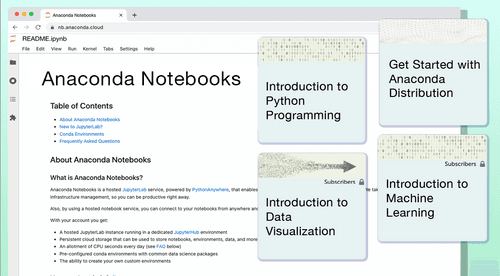Introducing Data Science Training and Cloud-Hosted Notebooks From Anaconda

Team Anaconda
3min

Open-source software, at its core, is built on contributions from the community. Open source relies on community members to develop packages, flag bugs, create new solutions, and continually improve the foundational project; without that support, open-source software wouldn’t exist. While individual developers, data scientists, students, and hobbyists often comprise most of a particular project’s community, it’s also important for businesses that use open-source software to contribute.
95% of enterprise IT leaders believe open-source software is vital for their enterprise infrastructure. We’ve seen numerous examples through the years of how open-source technology can spur the development and acceleration of a new business idea. However, this impact is a two-way street: businesses can affect open source as much as it can impact them. Unfortunately, sometimes flawed mindsets like taking a scarcity approach or failing to grasp the workings of the open-source innovation commons lead businesses to be less-than-ideal participants in the community. What are the roots of these misunderstandings, and how can we correct them so companies can be good stewards of the open-source community?
When using open-source technologies, it’s important to understand the economics of the open-source innovation commons. While open-source software is, in strictly monetary terms, “free,” that simplistic viewpoint belies the hard work and community effort that goes into not only creating a project but also maintaining it so that it remains usable over time. The collective community that spans across individual projects is the source of innovation and new ideas: in open source, the whole is greater than the sum of its parts. That’s why viewing support for open source as a one-to-one ratio, where a business only donates to a particular project that it uses, doesn’t really contribute to the wider innovation commons. Donating to individual projects is a good start, but it misses the larger point.
For open source to continue thriving, enterprises need to invest in the wider community, despite the difficulty in measuring immediate ROI. You can imagine the open-source ecosystem like a fruit-bearing tree, where the community creating the software is the tree, and the projects are the fruit. If businesses only focus on harvesting the fruit, then the underlying tree will eventually wither and die, and there won’t be any more fruit at all. Instead, if businesses invest in the tree and ensure that the roots are healthy and well taken care of, the tree can produce better and more fruit for everyone.
Investing in the broader open-source community, rather than exclusively in individual projects, can be difficult. There’s often no transparent accounting for each dollar’s net benefit, which can be daunting for a business. But it’s important to remember that investing in open source is much more cost- and time-effective than developing and maintaining all of your software in-house.
Businesses can support the broader open-source community, rather than just individual projects, by investing in things like conferences and access to hardware for different developer groups. This helps strengthen the community as a whole and supports the overall innovation commons. For example, one way we’ve chosen to do this at Anaconda is through the Anaconda Dividend Program. It works by donating 1% of our Commercial Edition revenue to the NumFOCUS organization to support various open-source projects and programs. Although we continue to also contribute to projects on a more ad-hoc basis, we felt it was important to establish a way to invest in open source that would support the sustainable, long-term growth of the innovation commons.
Working together yields greater results than working alone, and the same principle applies to open source. For open source to be sustainable, we have to abandon the scarcity mindset that views open-source software as a finite resource and use an abundance mentality instead. Above all, this means supporting and ensuring the wider community’s health, rather than focusing only on specific projects, to sustain continuous innovation. Businesses can have a large effect on the open-source community and its development; with a thoughtful approach that supports the whole innovation commons, that impact can be especially positive.
Talk to one of our experts to find solutions for your AI journey.